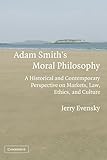Adam Smith's moral philosophy : a historical and contemporary perspective on markets, law, ethics, and culture / Jerry Evensky.
Material type: TextSeries: Historical perspectives on modern economicsPublication details: New York, NY : Cambridge University Press, 2005Description: xv, 331 p. ; 24 cmISBN: 0521852471 (hbk.); 9780521852470 (hbk.)Subject(s): Smith, Adam, 1723-1790 | Economics -- Moral and ethical aspects | Ethics | Teleology | Equality | Smith, Adam, 1723-1790. Inquiry into the nature and causes of the wealth of nations | Smith, Adam, 1723-1790. Theory of moral sentiments | Smith, Adam, 1723-1790 -- Criticism and interpretationDDC classification: 174/.4 LOC classification: HB103.S6 | E93 2005Online resources: Table of contents only | Publisher description | Contributor biographical information
TextSeries: Historical perspectives on modern economicsPublication details: New York, NY : Cambridge University Press, 2005Description: xv, 331 p. ; 24 cmISBN: 0521852471 (hbk.); 9780521852470 (hbk.)Subject(s): Smith, Adam, 1723-1790 | Economics -- Moral and ethical aspects | Ethics | Teleology | Equality | Smith, Adam, 1723-1790. Inquiry into the nature and causes of the wealth of nations | Smith, Adam, 1723-1790. Theory of moral sentiments | Smith, Adam, 1723-1790 -- Criticism and interpretationDDC classification: 174/.4 LOC classification: HB103.S6 | E93 2005Online resources: Table of contents only | Publisher description | Contributor biographical information | Item type | Current library | Collection | Call number | Copy number | Status | Date due | Barcode |
|---|---|---|---|---|---|---|---|
 Book
Book
|
University of Macedonia Library Βιβλιοστάσιο Α (Stack Room A) | Main Collection | HB103.S6E93 2005 (Browse shelf (Opens below)) | 1 | Available | 0013108589 |
Includes bibliographical references (p. 313-324) and index.
1. Adam Smith's vision -- 2. On human nature, social norms, co-evolution, natural selection, and the human prospect -- 3. On the role of positive law in humankind's evolution -- 4. On the role of religion in humankind's evolution -- 5. On the progress of opulence, setting the scene in book I of "The wealth of nations" -- 6. The role of capital in the progress of opulence : the analysis of book II of "The wealth of nations" -- 7. An unnatural path to natural progress : Smith represents the power of his principles in book III of "The wealth of nations" -- 8. Smith on the mercantile system and the evolution of his voice : book IV of "The wealth of nations" and part VI of "The theory of moral sentiments" -- 9. On the role of government : book V of "The wealth of nations" -- 10. "Chicago Smith" versus "Kirkaldy Smith" -- 11. Toward a dynamic three-dimensional analysis -- 12. The liberal plan and the quandary of capital -- 13. Epilogue : on the human prospect.
"Adam Smith is best known among economists for his book, The Wealth of Nations, often viewed as the keystone of modern economic thought. For many, he has become associated with a quasi-libertarian laissez-faire philosophy. Others, often heterodox economists and social philosophers, on the contrary, focus on Smith's Theory of Moral Sentiments, and explore his moral theory. There has been a long debate about the relationship or lack thereof between these, his two great works. This work treats these dimensions of Smith's work as elements in a seamless moral philosophical vision, demonstrating the integrated nature of these works and Smith's other writings. Although many practitioners today see the study of Smith as an antiquarian exercise, this book weaves Smith into a constructive critique of modern economic analysis (engaging along the way the work of Nobel Laureates Gary Becker, Amarty Sen, Douglass North, and James Buchanan) and builds bridges between that discourse and other social sciences." -- Book jacket.





There are no comments on this title.